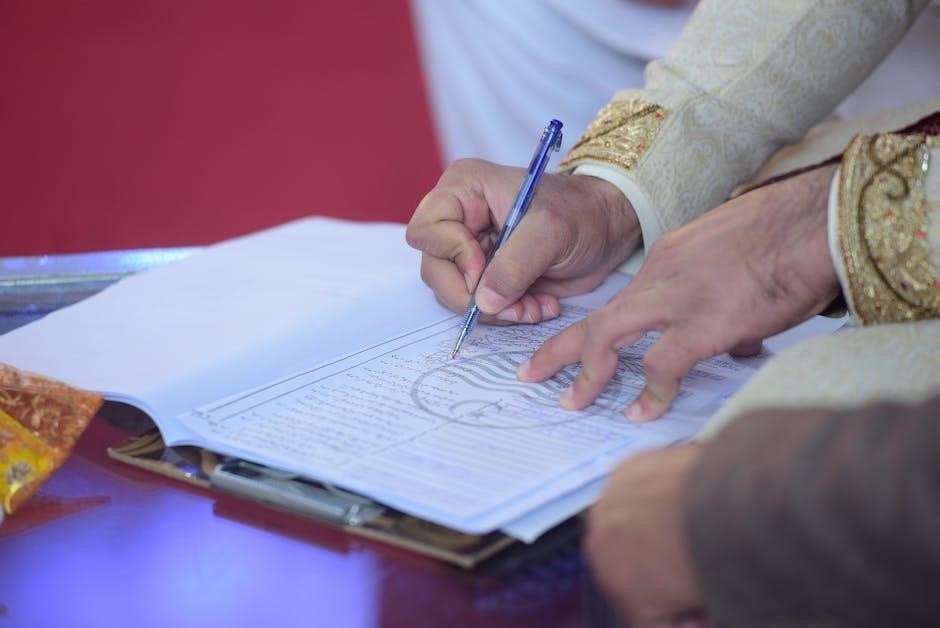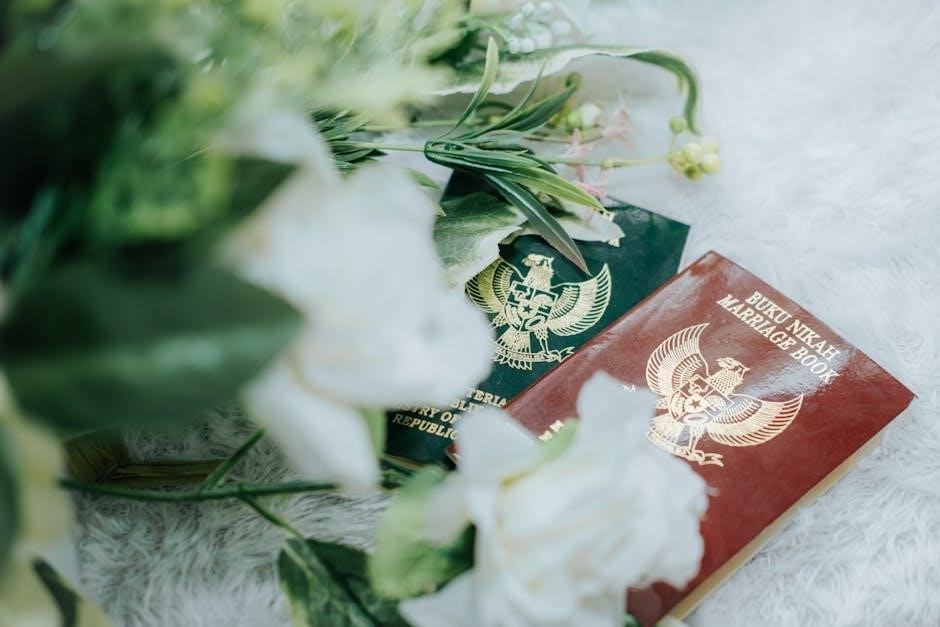The Nikah Nama is a formally structured marriage contract in Islamic law, ensuring legal recognition and documentation of a Muslim marriage․ It is typically written in Urdu or English, accommodating linguistic preferences, and serves as a comprehensive record of the union․ This document is integral to Islamic marriage proceedings, outlining terms, rights, and responsibilities of both partners, while also providing proof of marriage for legal purposes․
Definition and Purpose
The Nikah Nama is a legally binding Islamic marriage contract that outlines the terms and conditions of a union between a bride and groom․ It serves as a written document formalizing the marriage, ensuring both parties’ rights and responsibilities are clearly defined․ The purpose of the Nikah Nama is to provide a structured agreement that validates the marriage under Islamic law, ensuring clarity on issues such as dowry (Mahr), divorce rights, and maintenance․ It acts as a safeguard for both partners, offering legal and religious recognition of their commitment to one another․
Legal Status and Recognition
The Nikah Nama holds legal recognition in Pakistan and is accepted internationally, particularly with an English translation, ensuring its validity for immigration and legal proceedings worldwide․
Legal Recognition in Pakistan
The Nikah Nama is legally recognized in Pakistan and serves as a binding marriage document under Islamic law․ It is structured with 25 columns to ensure comprehensive documentation, accommodating both Urdu and English languages․ This legal document is accepted by Pakistani courts and authorities, providing formal proof of marriage․ Its recognition extends to matters of divorce, inheritance, and maintenance rights, ensuring legal protection for both spouses․ The Nikah Nama is essential for official purposes, verifying the legitimacy of a marriage and safeguarding the rights of the bride and groom under Pakistani law․
Recognition in Other Countries
The Nikah Nama is recognized in several countries beyond Pakistan, particularly for verifying Muslim marriages․ In the U․S․, for immigration purposes, Pakistani Muslim applicants must provide an original, signed Nikah Nama along with its English translation and a NADRA marriage certificate․ Similarly, in countries like South Africa, recognition of the Nikah Nama has been studied to understand its implications for Muslim women’s rights․ While recognition varies by jurisdiction, the document is widely accepted as proof of marriage in many nations with significant Muslim populations, ensuring legal validity and protecting spouses’ rights internationally․
Legal Requirements for Validity
The Nikah Nama must meet specific legal criteria to ensure validity․ It requires accurate and precise information, including full names, dates of birth, addresses, and fathers’ names, which must match official identification documents․ Use of black or blue ink is recommended for clarity․ The document must include the bride’s right to delegate the power of divorce and details of the Mahr (dowry)․ Witnesses’ signatures are mandatory, and the contract must adhere to Islamic law principles․ Compliance with these requirements ensures the marriage is legally recognized and enforceable under both Islamic and civil law frameworks․

Structure and Content of the Nikah Nama
The Nikah Nama is structured with 25 columns, ensuring comprehensive documentation․ It includes essential information like names, dates, addresses, and Mahr details, written in Urdu or English for clarity and accessibility․
Essential Information Required
The Nikah Nama requires detailed personal information, including full names, dates of birth, addresses, and fathers’ names, ensuring accuracy and matching official identification documents․
The Mahr (dowry) details, including its amount and payment terms, must be clearly specified․
Additional clauses may outline special conditions agreed upon by the couple, such as divorce rights or maintenance obligations․
Witnesses’ names and signatures are also essential for validation․
The document must be filled out legibly, preferably in black or blue ink, to avoid ambiguity and ensure legal validity․
Special Conditions or Clauses
Special conditions or clauses in the Nikah Nama allow couples to customize their marriage contract according to their preferences and circumstances․
These clauses may include specific agreements regarding divorce rights, maintenance obligations, or Mahr payment terms․
Conditions must comply with Islamic law to be legally valid․
Couples can also outline mutual responsibilities or financial arrangements․
Including such clauses ensures that both parties’ rights and expectations are clearly defined, providing a framework for resolving potential disputes․
These customizations reflect the flexibility of Islamic marriage contracts in addressing modern marital needs․
Importance of Accuracy in Documentation
Accuracy in documenting the Nikah Nama is crucial to ensure its legal validity and acceptance․
Any errors or omissions can lead to disputes or render the document invalid․
Precise details, such as names, dates, and Mahr specifications, must be correctly recorded․
Inaccuracies can cause delays in legal proceedings or affect the rights of either spouse․
Therefore, careful attention to detail is essential when filling out the form to avoid future complications․
Ensuring clarity and correctness protects the interests of both partners and upholds the integrity of the marriage contract․

Filling Out the Nikah Nama Form
The Nikah Nama form must be filled accurately, ensuring all details, such as names, dates, and Mahr, are correctly specified․ Use legible ink and avoid errors to maintain clarity and legal validity, as this document serves as formal proof of marriage․
Step-by-Step Process
Filling out the Nikah Nama involves a structured approach․ Begin with personal details of the bride and groom, including names, dates of birth, and addresses․ Specify the Mahr amount and its payment terms․ Next, outline any special conditions agreed upon by both parties․ Ensure all information matches official documents for accuracy․ Use black or blue ink for clarity․ After completing the form, obtain signatures from both partners, witnesses, and the officiating authority․ Finally, verify the document for errors before submission to ensure legal validity and acceptance․
Tips for Filling Out Accurately
Accuracy is crucial when completing the Nikah Nama․ Use a legible pen, preferably in black or blue ink, to avoid ambiguity․ Ensure all details, including full names, dates of birth, and addresses, are correctly spelled and match official documents․ Double-check the Mahr amount and its payment terms․ Avoid leaving any fields blank, as this may lead to delays or rejection․ Cross-verify all information with witnesses and signatories before finalizing․ Do not overlook special conditions or clauses, as they are legally binding․ Ensure signatures are clear and avoid alterations or corrections that could render the document invalid․

Role of Witnesses and Signatories
The Nikah Nama requires at least two male witnesses or four female witnesses to validate the marriage․ Their signatures, along with the Molvi, confirm the union’s legality and mutual consent․
Who Can Be a Witness
A witness for the Nikah Nama must be an adult Muslim of sound mind, capable of understanding the marriage contract․ Typically, at least two male witnesses or four female witnesses are required․ They must be impartial, unrelated by blood or marriage to either spouse, and able to identify the couple․ The witnesses play a crucial role in validating the marriage by attesting to the couple’s consent and ensuring the ceremony’s legality․ Their signatures on the document confirm their presence and agreement to the union, making the marriage officially recognized under Islamic law․
Significance of Signatures
Signatures in the Nikah Nama hold profound legal and symbolic importance․ They confirm the voluntary consent of both spouses, witnesses, and often a cleric or official, validating the marriage under Islamic law․ The bride and groom’s signatures indicate mutual agreement to the terms outlined in the document․ Witnesses’ signatures attest to the ceremony’s legitimacy, ensuring transparency and accountability․ These signatures make the marriage legally binding and provide a permanent record for future reference, safeguarding the rights and responsibilities of both partners in the eyes of the law and the community․

Mahr (Dowry) in the Nikah Nama
Mahr, or dowry, is a mandatory payment by the groom to the bride, symbolizing respect and security․ It is a key component of the Islamic marriage contract․
Significance of Mahr in Islamic Law
The Mahr, or dowry, holds profound significance in Islamic law as a divine ordinance and a symbol of respect for the bride․ It is a mandatory payment from the groom to the bride, ensuring her financial security and upholding her rights․ The Mahr serves as a commitment to the bride’s well-being and is considered a form of protection under Islamic teachings․ It also signifies the groom’s acceptance of responsibility for the bride, reinforcing the sacred bond of marriage․ The Mahr is a key element in the Nikah Nama, making the marriage contract legally binding and morally upright․
Rights of the Bride in the Nikah Nama
The Nikah Nama ensures the bride’s rights, including the right to Mahr, maintenance, and divorce under specific conditions, safeguarding her financial and legal security in marriage․
Divorce and Maintenance Rights
The Nikah Nama explicitly outlines the bride’s rights regarding divorce and maintenance, ensuring her financial and legal protection․ It specifies conditions under which the husband can exercise his right to divorce and whether any restrictions apply․ The document also clarifies the bride’s right to initiate divorce, known as khul’a, and the process for seeking maintenance․ In cases of separation, the Nikah Nama details the bride’s entitlement to post-divorce financial support, ensuring her well-being․ This legal framework safeguards her rights, providing clarity and security in the event of marital dissolution․
Documents Required for Nikah Nama Registration
Essential documents include CNIC, passport, witness signatures, and official identification of both parties․ These ensure identity verification and legal compliance for marriage registration․ Accuracy is crucial․
Necessary Documentation
The Nikah Nama requires essential documents to ensure legal validity․ These include the bride’s and groom’s CNIC or passport, witness signatures, and official identification․ For international purposes, such as U․S․ immigration, an original signed Nikah Nama, its English translation, and a NADRA-issued marriage certificate are mandatory․ These documents must be accurate and verified to avoid discrepancies․ The English translation ensures recognition in non-Urdu speaking regions, while the NADRA certificate validates the marriage officially․ Proper documentation is critical for legal and administrative processes, ensuring the marriage is recognized both locally and internationally․
